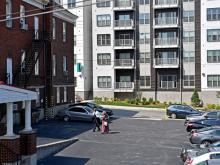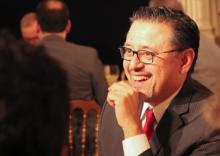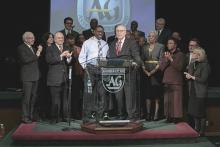assemblies of god

THE PASSION CENTER is a Christian community in Pembroke Pines, Fla., about 20 miles north of Miami. The organization is affiliated with the Assemblies of God, a Pentecostal denomination, but it neither emphasizes its denominational ties nor resembles a traditional church. This self-described “holistic ministry training center” has no building, but it has a mission to keep Jesus and social justice intertwined.
The faith community was founded and is led by Elizabeth Rios, who earlier started the Center for Emerging Female Leadership in New York. Members of the Passion Center used to meet regularly for community service projects, local demonstrations advocating for the priorities of marginalized communities, dinners in local restaurants, and a monthly comedy night for their neighborhood. The pandemic shut down the in-person gatherings. Unlike many other Pentecostal and charismatic churches, the Passion Center leadership had no qualms about following the science. They had no building to close; they just transitioned their ministries online. The Passion Center is one example of Pentecostals who don’t mind getting politically engaged in justice work to further the reign of God here on earth.
Pentecostalism is one of the fastest growing Christian movements in the world. In 1980, about 6 percent of Christians globally were Pentecostal—now it’s 25 percent. As of 2014, there were 10 million Pentecostals in the U.S. In many places around the world, Pentecostalism is the predominant face of Christianity. These rising numbers are shifting Christianity’s demographic center from the prosperous North to the global South.

R. Marie Griffith, director of the John C. Danforth Center on Religion and Politics at Washington University in St. Louis, said that the Assemblies of God, founded in 1914, has had a “fascinating history” of women’s leadership, with women leading congregations and speaking from pulpits in its early days and later often finding their roles restricted.

The church’s predominately black congregation once mirrored the neighborhood’s demographics. But today hip and eclectic East Nashville, with its rising property values and trendy restaurants, draws white millennials, said the Rev. Morris Tipton Jr., the church’s pastor.
Given the neighborhood’s shift, is Tipton worried about the church’s future?

The centerpiece of President Trump’s religious freedom agenda, and the carrot he often dangled in front of Christian leaders as he sought their support during the campaign, was a pledge to overturn a 1954 law that says houses of worship can lose their tax-exempt status if they engage in partisan campaigning.
But a new survey of evangelical leaders — mainly pastors whose flocks were crucial to Trump’s victory in November — shows that close to 90 percent of those asked opposed the idea of clergy endorsing politicians from the pulpit.

The Southern Baptist Convention is the largest Protestant denomination in the country, but it continues to lose members and baptize fewer people each year.
The latest statistics, compiled by LifeWay Christian Resources from church reports, show membership has dropped by more than 204,000, down 1.3 percent to 15.3 million members in 2015. It’s the ninth year in a row there has been a membership decline.

An alliance of evangelical organizations has pledged to dramatically increase the number of church-based legal clinics across the country to assist immigrants with the complicated processes of seeking green cards, visas and family unification.
The Immigration Alliance, a network of 15 evangelical denominations and ministries, on Oct. 21 launched a plan to reduce the gap between the 22 million immigrant noncitizens and the 12,000 private immigration lawyers in the country.
“Churches are a trusted presence in immigrant communities that can — and should — help address this critical shortage of legal services,” said Noel Castellanos, the alliance’s board chair and the CEO of the Christian Community Development Association, in announcing the new venture.
The alliance, which was formed in 2013, estimates that there also are 2,800 nonprofit attorneys and accredited staff in the country. The umbrella network includes the National Association of Evangelicals, the Assemblies of God, the Church of the Nazarene and the National Latino Evangelical Coalition, among others.

When he was a boy, the Rev. Thomas Barclay noticed a difference between the worshippers of his small Pentecostal denomination and churches he visited of the larger Assemblies of God.
“Why are they all white and we’re all black?” he asked his father.
After a racial divide that lasted for nearly a century, the two denominations, the Assemblies of God and the United Pentecostal Council of the Assemblies of God, have agreed to a new partnership.
WHEN I FOUND out years ago that most early Pentecostal denominations had been committed to nonviolence—including the Assemblies of God, the denomination of my heritage—I thought it was about the dumbest thing I’d ever heard. Not kill for the United States of America (or any country)?
Then I stumbled upon the Pentecostal Evangel, a weekly magazine of the Assemblies of God (USA), which published these revealing words during World War I:
From the very beginning the [Pentecostal] movement has been characterized by Quaker principles. The laws of the Kingdom, laid down by our elder brother, Jesus Christ, in the Sermon on the Mount, have been unqualifiedly adopted, consequently the movement has found itself opposed to the spilling of the blood of any man.
This was new to me. I was reared in a U.S. Pentecostalism that taught intense loyalty to the United States and deep pride in combatant military service. Where did this hidden history of Pentecostal nonviolence come from?
Reading other early accounts of Pentecostal peacemaking prompted me to further examine where it had gone and whether it could re-emerge. It would also challenge and deconstruct my understanding of Christianity.

The Assemblies of God, a denomination rooted in rural and small town America, appears to have leaped into the 21st century with dramatic results.
At its General Council meeting last week, the denomination touted its formula for defying the seemingly irreversible decline of other religious groups: contemporary music, arts and high-tech quality communication, outreach to young people, immigrants and ethnic minorities.
The denomination reported a 1.8 percent increase in U.S. membership to 3 million adherents. Globally, the gain was 1.5 percent, to 66 million, making it the largest Pentecostal group in the world.
Why are the Assemblies of God defying the odds?